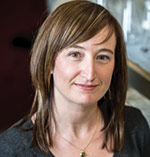No more one-size-fits-all drugs. As genetic screening becomes more affordable and pharmacogenetic research diversifies, pharmacists look to implement the therapeutic benefits.
By Athena Ponushis
The promise of personalized medicine paints a utopia, where scientists would understand the genetic variations responsible for diseases and be able to prescribe drugs aimed at those genes. Medical records would contain information unique to patients’ genomes—genetic features that may predispose them to disease, variations that might predict a drug or dosing response—along with environmental and lifestyle factors, such as poverty or diet. All this data would be in the face of a provider, at the moment of prescribing, to tailor treatments for better patient outcomes.
Such a visionary tomorrow leaves much work for today. Pharmacogenetic research needs to be diversified, to improve drug response and decrease drug toxicity for all people, not just those of European descent. And the medical community must keep an open mind—precision medicine does not have to save the market a lot of money to be of good value.
As the cost of genetic testing goes down, it may make good economic sense for a consumer to have a genetic test (the amount of health you’re buying for the amount of money you’re spending falls in line with what’s considered good value), making widespread implementation of precision medicine potentially feasible in 10 years.
Therein lies a call to pharmacists and schools of pharmacy, to increase pharmacogenetic research and education. “I really think pharmacogenomics is going to be the expertise of the pharmacists,” said Dr. Erica Woodahl, associate professor at the University of Montana. “Pharmacists know the most about drugs and their usage, so it makes perfect sense for this to fall within a pharmacist’s job. As we move toward implementation, hopefully we’ll have a model where most hospitals have a clinical pharmacist who has specific training in pharmacogenomics to review the records and offer consultations to providers, to really facilitate the pharmacogenetics of personalized medicine.”


 “Hopefully we’ll have a model where most hospitals have a clinical pharmacist who has specific training in pharmacogenomics to review the records and offer consultations to providers, to really facilitate the pharmacogenetics of personalized medicine.”
“Hopefully we’ll have a model where most hospitals have a clinical pharmacist who has specific training in pharmacogenomics to review the records and offer consultations to providers, to really facilitate the pharmacogenetics of personalized medicine.” “I guess there’s an important ‘bigger-picture’ misconception that in order to provide good value, something has to be cost-saving, and that’s just not the case. Anything that improves patient outcomes at a reasonable cost is a good value.
“I guess there’s an important ‘bigger-picture’ misconception that in order to provide good value, something has to be cost-saving, and that’s just not the case. Anything that improves patient outcomes at a reasonable cost is a good value.